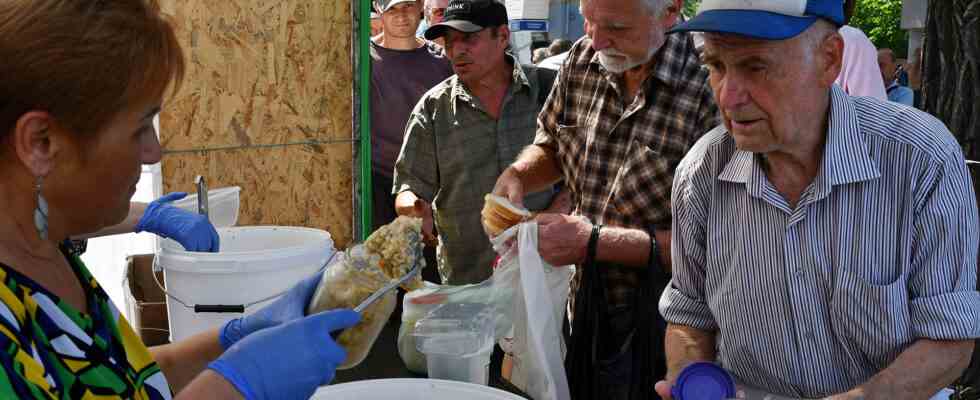Status: 08/23/2022 5:21 p.m
The war hit Ukraine hard economically. Inflation and unemployment are high, many people are in need of support. And some started from scratch.
The helpers at a food distribution center in Kramatorsk in eastern Ukraine hand out around 1,000 packages of milk, bread, sausage and canned food to the needy every day. Many people in the city in Donbass are dependent on the help, explains helper Sasha. “No work, no wages, nothing to pay for. Anyone who had money has now spent it,” he says.
Many residents left Kramatorsk at the beginning of the war. Now they are coming back and need support. The savings are gone. Economic analyst Olga Bakanova explains: “Of course there is minimal support for those who fled. There is help for the children of refugees, for those who fled from the occupied territories to Kyiv or western Ukraine.” But these are not large sums with which one can survive.
Unemployment rose to 35 percent
The war hit Ukraine hard economically. Inflation is high, and those who still have work often no longer get paid their full salary. According to estimates by the National Bank, unemployment in the country has risen to around 35 percent. Before the war, unemployment was around nine percent.
But not all of those who have lost their jobs depend on food donations. The middle and upper classes can often still live on savings. Like Alexander Odintsov from Kiev. Before the war he worked in real estate. “When the war started, I had an appointment for a preliminary contract in Irpin at 11 a.m.,” he says. “But by 10 a.m. the first Russians were already there, the war was already underway. And I haven’t done any business since then.”
Odintsow’s family now lives in Germany. He himself can only afford everyday necessities because he can currently live with friends for free. Just a few months ago, the family could afford several vacations a year. They were fine. “The prospects are that the market will continue to fall until the war is over,” he believes. “At least in Kyiv, because Kyiv has been endangered since the first days of the war.”
Helmets for the Ukrainian army
Because only a few people in Ukraine have hope that the economic situation will stabilize, some have started from scratch in another area. Helmets for the army are being produced in an industrial hall in Kyiv between white and brightly painted chipboard. The small factory has only existed for 30 days. Owner Severion Dangadze wants to create jobs while helping the Ukrainian army. “We have around 90 people working for us at the moment,” he says. “But in two weeks, when we start full production, it will be 150. We are constantly growing and we pay good salaries between 700 and 2000 euros.”
Topic overview
war in Ukraine
When the war begins, Dangadze – like many Ukrainians – joins the territorial defense. But there is a lack of protective clothing such as vests and helmets. First he buys some from abroad – but they are expensive and not always of the right quality. Today, many people work in his company, like Valerii, who had to flee to Kyiv from Konstantinovka in eastern Ukraine. “There’s war at home,” he reports. “There’s no water, no gas, there’s still electricity. That’s why we moved here.”
With the money Valerii earns in the helmet factory, he can afford an apartment and food. And is not – like many other refugees – dependent on humanitarian aid.
Struggle for existence – how millions of Ukrainians become impoverished during the war
Rebecca Barth, currently ARD Kyiv, August 23, 2022 4:47 p.m

